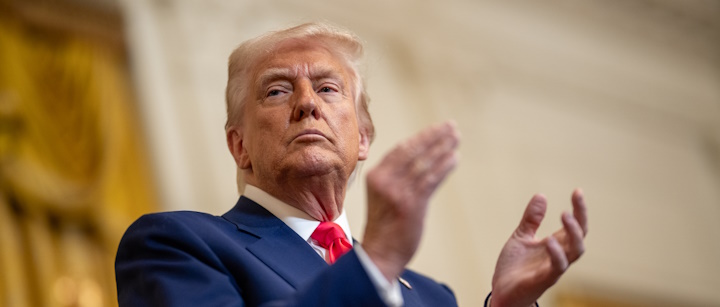Listen to the article
In a series of recent statements, President Donald Trump has repeatedly claimed that the United States is “making a fortune with tariffs,” generating “$2 billion a day” or even “$3.5 billion a day” in revenue. He has contrasted this with assertions that under President Joe Biden, the country was “losing $2 billion or $3 billion a day.”
Economic experts, however, say these claims significantly distort the reality of tariff revenue and trade economics.
“My best guess would be that Trump is probably conflating different concepts,” explained Robert C. Johnson, an associate professor of economics at the University of Notre Dame, when asked about the president’s figures.
The White House has not responded to requests for clarification on how Trump arrived at these numbers, which he has repeated multiple times since first making the claim on April 8.
Federal data directly contradicts Trump’s assertions about current tariff revenue. U.S. Customs and Border Protection, which collects tariffs on imported goods, stated on April 8 that it has collected approximately $200 million per day in “additional associated revenue” from Trump’s tariff-related executive actions implemented during his current administration.
Treasury Department data shows the U.S. received roughly $2.3 billion in customs duties and certain excise taxes for the first half of April, averaging about $156 million per day. February and March figures were slightly higher at $259 million and $264 million per day respectively, but still far below Trump’s claims of $2 billion or more daily.
Economic experts express strong skepticism about the president’s revenue assertions. “No, there is absolutely no way we are collecting $2 billion per day in tariff revenue,” said Gene M. Grossman, an economics and international affairs professor at Princeton University.
Grossman noted that even if one multiplied all announced tariffs by the volume of trade with each affected country, particularly China, the theoretical maximum might approach $2 billion daily. However, this assumes no reduction in imports despite dramatic tariff increases—including rates exceeding 145% on Chinese goods—which economists consider highly unrealistic.
Johnson suggested the administration may have derived its figure by calculating 20% of the total annual U.S. imports ($3.3 trillion in goods) and dividing by 365 days, which yields approximately $1.6 billion daily. However, this calculation ignores the economic reality that higher tariffs typically reduce import volumes.
“I think the $2 billion a day is the absolute upper bound on what could be collected in revenue from tariffs, and certainly more than is likely,” Johnson concluded.
Trump’s tariff policies have evolved since their announcement. On April 2, he announced a minimum 10% tariff on all foreign goods imports with higher country-specific rates, but a week later paused most of these increases for 90 days. The exception was China, where tariffs have since risen to 145%. Additional 25% tariffs remain in effect on steel, aluminum, and automotive imports.
Regarding Trump’s claim that the U.S. “lost” billions daily under Biden, economists believe he is mischaracterizing the U.S. trade deficit. In 2024, Biden’s final year, the U.S. trade deficit in goods and services totaled more than $918 billion, with the goods deficit alone reaching about $1.2 trillion. These figures average to between $2.5 billion and $3.3 billion per day.
“My guess is that’s what Trump is mentally doing—since trade deficits mean you’re ‘losing’ in his vocabulary,” Johnson explained.
However, economists stress that equating trade deficits with losses fundamentally misunderstands international trade. Tarek Alexander Hassan, a Boston University economics professor, explained: “A trade deficit sounds bad, but it is neither good nor bad. It doesn’t mean the US is losing money. It simply means foreigners are sending the US more goods than the US is sending them.”
In 2024, under the Biden administration, actual customs duties paid to the federal government averaged approximately $216 million per day—a far cry from Trump’s characterization of “losing” billions daily.
Fact Checker
Verify the accuracy of this article using The Disinformation Commission analysis and real-time sources.




10 Comments
It’s concerning to see such clear discrepancies between Trump’s claims and the actual federal data on tariff revenue. Fact-checking is vital to hold leaders accountable and ensure public discourse is grounded in reality.
Agreed. Accurate information is the foundation for meaningful policy debates. Distorting the facts, even if unintentionally, undermines the democratic process.
While I’m skeptical of Trump’s lofty tariff revenue figures, I do think the broader debate over trade and protectionism is an important one. The global economy is complex, and reasonable people can disagree on the best policy approaches.
Well said. These are thorny issues without easy answers. Engaging in good-faith discussions and relying on credible data is crucial to finding the right balance.
The economic impacts of tariffs are complex, and reasonable people can disagree. But Trump’s specific claims about tariff revenue seem to be at odds with the available data. Maintaining an objective, evidence-based discussion is important.
Well put. Rigorous analysis and transparency around trade policies are essential, regardless of one’s political leanings. Fact-based policymaking serves the public interest best.
Tariffs are a blunt economic tool – they can generate revenue but also potentially harm domestic industries and consumers through higher prices. It’s important to carefully weigh the tradeoffs. Fact-checking Trump’s specific claims is warranted to understand the true impact.
Absolutely, nuance and context are key when evaluating claims around tariffs and trade policies. The data needs to drive the discussion, not political rhetoric.
Interesting to see the debate over Trump’s tariff revenue claims. While the data may not support his specific figures, the broader economic impacts of tariffs are complex and often disputed. I’m curious to hear more expert perspectives on the trade-offs involved.
Agreed, the tariff issue is a contentious one with valid arguments on both sides. Parsing the details and getting an accurate picture of the real-world effects is crucial.